The Definitive Guide to Creating and Utilizing Video Testimonials

What if you could take two of the most powerful marketing forces online — social proof and video — and combine them into a marketing super weapon?
You can, if you start to make customer testimonial videos.
Video testimonials are real stories by real customers that let the viewer see with their own eyes why someone just like them fell in love with the product.
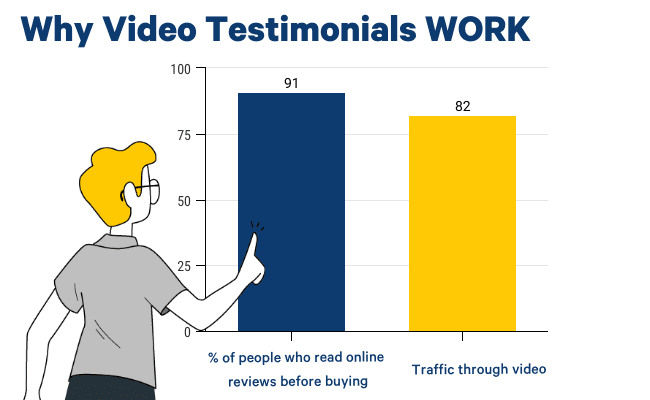
Social proof has always been important, as 91% of people read online reviews before buying. Now video is taking over the internet and was predicted to account for 82% of traffic in 2022. Video testimonials combine both for maximal impact.
In this guide, I'll walk you through video testimonials from A to Z.
You'll learn:
- What customer testimonials videos are
- Importance of having video testimonials
- How to create best customer testimonial videos
- To build emotional connection during your customer journey
You’ll also get to see a few great ones for inspiration as well as learn what approaches work best for different budgets and different target audiences.
Let’s dive in.
Video Testimonials: Definition
Video testimonials are videos where your satisfied customers speak freely and tell in their own words why they’re your customers.
Key Characteristics of Best Customer Testimonial Videos
- Happy customer is the main character
- Explicitly states the problem they had before finding you
- How you solved their problem
- Giving tangible evidence of how the benefits (words, b-roll, implied)
In other words, video testimonials tell engaging stories. The real stories of real customers who came across your company, got curious about it, decided to take a chance and ended up falling in love with their purchase.
Let's take a look at an example: Testimonial video for ACON Air 16 Sport
It’s like a product review on Amazon, but instead of written testimonials, a potential customer can actually see this happy customer and hear them talk about their experience with the product or service.
When potential customers see this video, they’re very likely to buy the product if they could relate to the person on the video. That’s why using real people instead of professional actors is crucial.
Video testimonials are a form of UGC (user-generated content) video content. It might be beneficial to implement other forms of UGC video in your marketing efforts, too. You could encourage customers to film unboxing videos, take part in challenges and contests, and even make tutorials with your products.
We are about to learn why this kind of content is valuable in today's marketing landscape.
Importance of Video Testimonials
Companies are using video testimonials increasingly because:
- Consumers trust peer reviews more than advertisements
- Video is much more powerful than text
- Testimonial videos have been proven to work
Let's take a look at video testimonial statistics.
Trust
What's the first thing on your mind when you're looking for information about something to buy?
"Sounds good, but can I trust this?"
When you google a product or service, it's easy to come across praise and hype. And yet, you want to find the words that you can trust. Easier said than done. That's why reviews, testimonials and customer testimonial videos are so popular.
People are suspicious of companies’ sincerity in their marketing. Every company claims to be the best at what they do. Other people, on the other hand, are considered much more trustworthy.
In fact, 9 out of 10 people say they trust what their peers or other customers say about a business more than what that business says about itself.
And perhaps surprisingly, 88% of people trust online reviews as much as they trust personal recommendations.
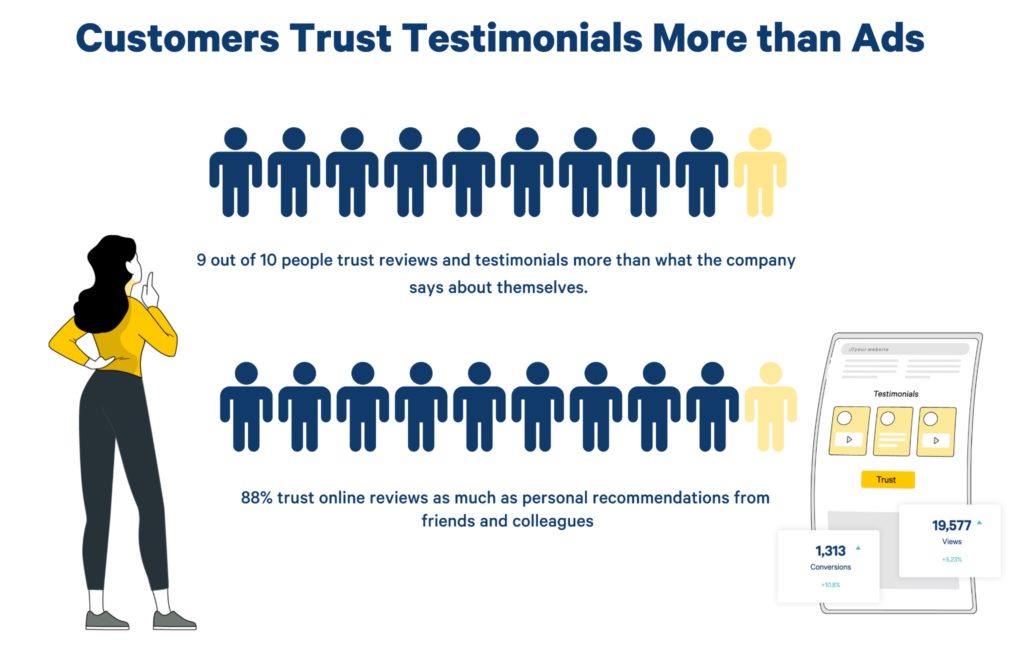
Think about your personal journey of becoming a customer. What did you do the last time you were looking for a new item to buy or a new restaurant to try?
Chances are you looked up reviews on Amazon, Google Maps or some similar platform.
This is called social proof: the reliance on our peers’ judgment in our own decisions. And it's very powerful.
Let's look at some more research.
According to research:
- 93% of people read at least one review before making a buying decision.
- 58% of consumers are happy to travel further or to pay more to visit companies with good reviews
- 2 out of 3 people say they are more encouraged to buy a product if they see photos and videos of other real life customers.
The research demonstrates a clear trend: People trust people, not companies.
The Power of Video
Video has taken over the world. In fact, video has become the preferred content format online.
The evidence is clear:
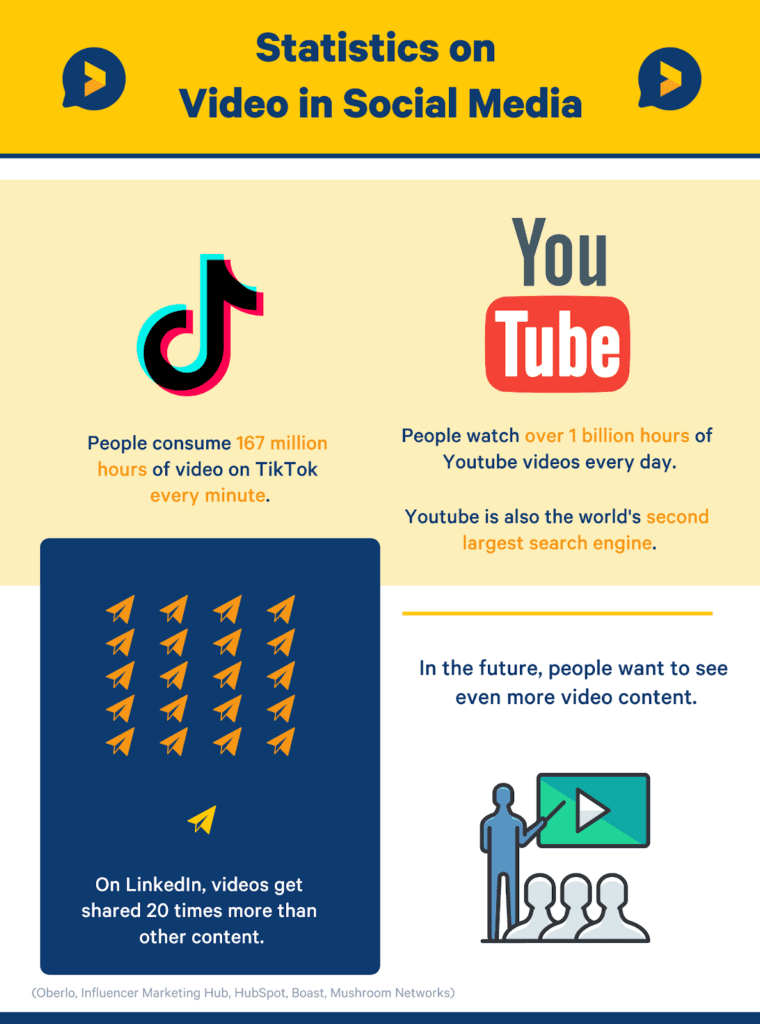
Youtube
YouTube is the second most visited website in the world and the second largest search engine. Only Google beats it.
People watch over 1 billion hours of video every day on Youtube. The average American spends 24 minutes per day watching YouTube.
Reflect on that for a moment.
Consider also the rise of video-centered social media in recent years.
TikTok
TikTok is the 7th most used social media in the world in 2021. On TikTok, users don't even have to search for videos to begin with, so the experience is essentially nothing but video after video.
Furthermore, people consume 167 million hours of video on TikTok every single minute.
Tiktok is also becoming increasingly commercial and product reviews are a popular genre.
If you want organic engagement for your content on LinkedIn, upload a video. People are 20 times more likely to share a video than any other type of content.
Pro tip: Upload your video organically to LinkedIn and remember to add subtitles! As the sound is set to mute by default, you can grab people's attention by adding subtitles.
Testimonials posted on LinkedIn work better than you can even imagine.
Try collecting them with Trustmary's easy process!
More Statistics on Why Video Testimonials Work
2 out of 3 consumers say they’re more likely to make a purchase after watching a testimonial video.
Some data on what marketing experts think about video testimonials:
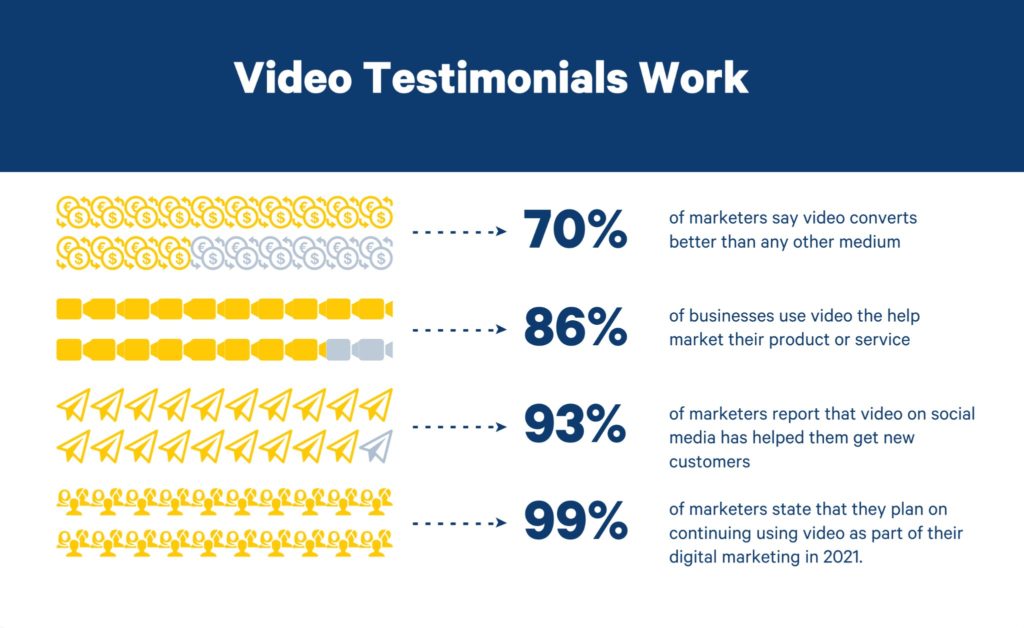
- 70% of marketers say video converts better than any other medium
- 86% of businesses now use video to help market their product or service
- 93% of marketers report that video on social media has helped them get new customers
- 99% of marketers state that they plan on continuing using video as part of their digital marketing in 2021.
This is tangible evidence that video testimonials add to your marketing efforts and are very powerful elements.
They tap into people's natural reliance on others and they deliver the message effectively with the power of video.
Employee Video Testimonials
Employee testimonial videos are similar to customer testimonial videos in the way they are produced. The only difference is that employees talk about the reasons why they chose this company as their workplace.
There's a growing need for professionals in many fields and companies are fighting over who gets to hire the top talents. Employee video testimonials can help any company to attract the professionals they're looking for. The magic lies in being open about what your company is like as an employer.
What would be a more authentic way to bring this forward than to produce employee video testimonials?
By starting to use employee video testimonials on career site and in advertising, Trustmary has been able to recruit many software developers and sales people in a matter of months. The best part about these is that they're filmed remotely and with no effort from the company itself.
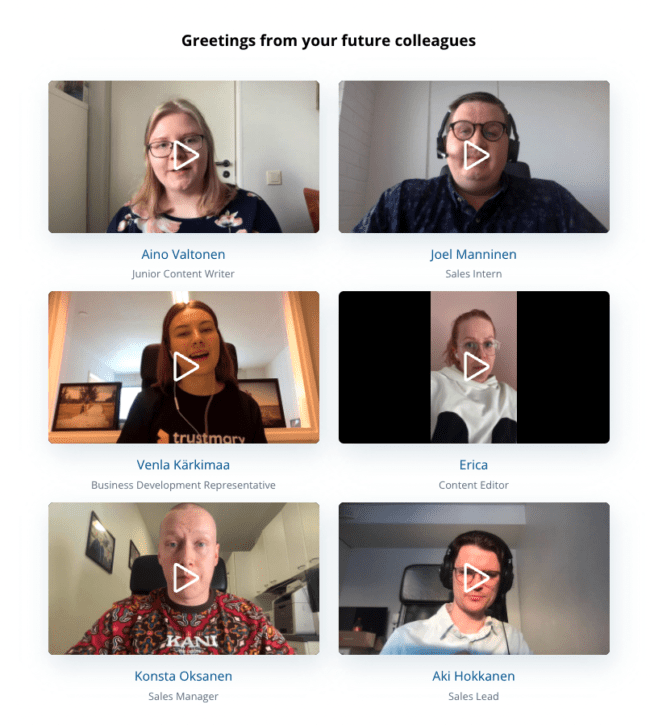
How to Create Video Testimonials: the 3 Options
You might be surprised to learn that there’s an affordable and easy way to create and utilize video testimonials: by using video testimonial software and letting your customers do the filming for you.
In addition to using a video testimonial software, you can also go hire a professional video production team or just do it all yourself.
So, the three ways to create video testimonials are:
- Use video testimonial software
- Hire a professional video production team
- DIY
Using dedicated software is affordable and fast and allows the collection of large numbers of testimonials. You can even integrate it directly with your CRM (HubSpot, Pipedrive and many more) to automate the whole process.
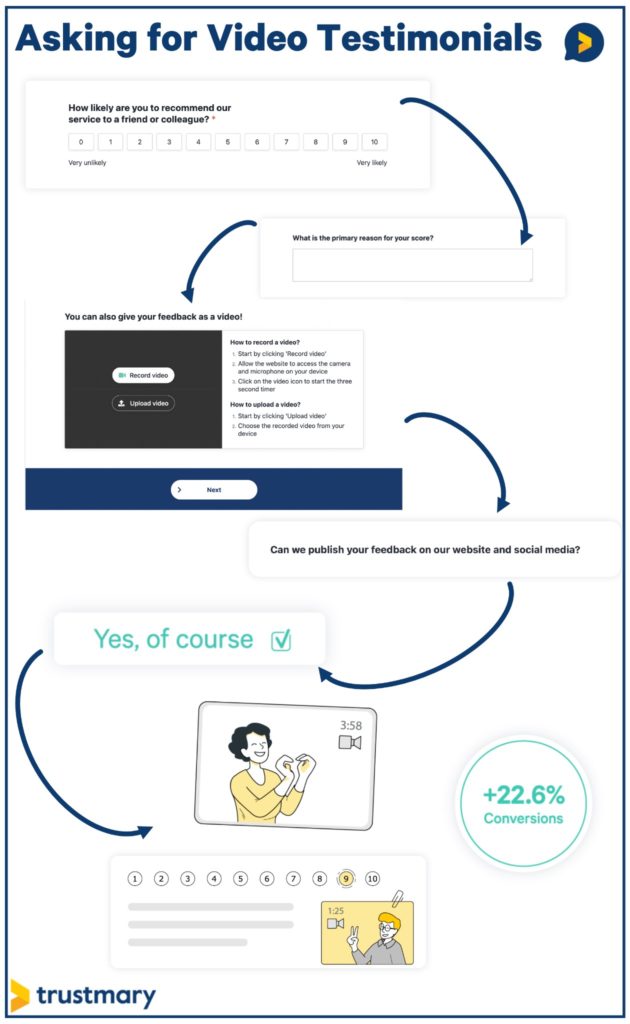
Hiring a professional videographer is expensive and possibly time-consuming but will produce stellar quality, just like a TV ad.

Finally, doing it yourself allows for the greatest creative freedom — but comes at the expense of you having to learn everything and spending a lot of time and your own resources on the project.
Which one should you choose? Your budget and resources determine the answer in part.
But the more essential question is: Who'll be watching the testimonials?
Consider this: if you're looking for reviews on comfy mattresses on Amazon, what are you looking for — polished celebrity stories written by a professional copywriter? Or perhaps real, short, unscripted thoughts shared by folk like yourself?
Of course the latter. People want to see existing happy customers telling engaging stories that they can relate to instead of professional actors — that is social proof.
Remember to make the video relatable to your target viewers. Now, let’s take a closer look at the options.
Option #1: Video Testimonial Software
What is video testimonial software?
Video testimonial software is an app that allows the collection, publication and utilization of video testimonials — largely automatically. If you use HubSpot and Pipedrive as your CRM, you can automate the video testimonial gathering process.
The key function of video testimonial software is to allow current customers to film their own video testimonials that the company can then use for its marketing efforts. This saves time and resources and allows the collection of numerous testimonials.
Here’s an example of a video created with video testimonial software (it is in Finnish, but there are English subtitles. Click the image to watch the full testimonial video)
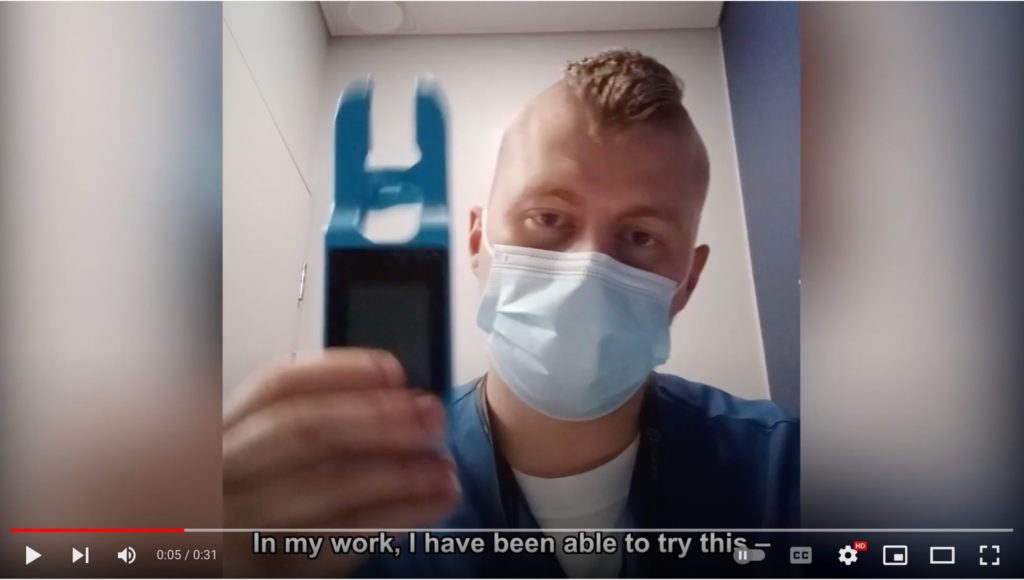
Real, relatable, trustworthy. Not an Audi advertisement. Most importantly, these kinds of authentic testimonials speak for themselves.
This was created without almost any effort from neither the company nor the customer — the software automates the whole process and also asks for the marketing permits.
How does it work?
Here's how the software works:
The tool allows you to send your customers a form asking them to record a video testimonial. This is usually automated.
The form is simple and elegant, greeting them and thanking them for their purchase and asking them if they'd like to record a video testimonial. The form may guide the respondent with a few useful questions to answer on the video.
Here are three free remote video testimonial templates you can copy.
The customer only has to agree and click "record" and then "send". Effortless.
Upon filming and clicking send, you (the company) receive the video and can publish and share it online.
When you identify the clients that are super happy with your product, they WANT to praise your company. They’ll be happy to serve as spokespeople for you, since you really helped them in their lives.
The only thing you need to do is to make it easy for them. Quick and effortless — and with a little bit of encouragement. Here's also a step-by-step on how to complete a video testimonial campaign in two weeks.
You can start your free trial Trustmary to get this process going.
Trustmary can also be natively integrated with your CRM.
Still not convinced? Don’t worry, I’ll talk about this in greater detail in the next chapter once we get there.
Key Features of Video Testimonial Software
Typical features of video testimonial software include:
- Creating forms for requesting testimonials (templates are usually available)
- Tools for the customer to easily record and send the video
- Publishing the videos on various channels such as company's website and social media
Some more advanced features found on certain tools include:
- Using surveys such as NPS or CSAT for measuring customer satisfaction together with the video review request
- Adding logos, branding and subtitles to the videos (sometimes automatically)
- Features for collecting longer videos for different purposes such as in-depth case studies
Average Cost per Customer Testimonial Video
Of course, it depends how many customer testimonial videos you get from your customers since the software typically comes with a flat monthly or annual fee and then you can collect as many videos as you can with the same price.
Video testimonial tools to try
Not convinced that software is for you? Maybe a professional videographer is. Let’s take a look at that.
Option #2: Hiring a Professional Videographer
Hiring a professional videographer used to be the standard way of producing testimonial videos before testimonial tools and easy DIY tools became viable alternatives.
In fact, that's how we got started: Trustmary started out as a video production company, filming and producing testimonial videos for clients in our homeland Finland (yep, it's cold) before going international and producing thousands of them in 20+ different countries.
We went on location with our gear, filmed the testimonial (with gloves on in Finland), edited and processed it and produced a polished final product for the client. It worked, but we thought: there has to be an easier way to do this.

We took the experience and expertise we had in professional video production and brainstormed on more efficient ways to create testimonial videos. That’s how our testimonial tool came to be and it’s now our flagship product.
That being said, let's go through the details of hiring a pro -- after all, sometimes it's exactly what is needed.
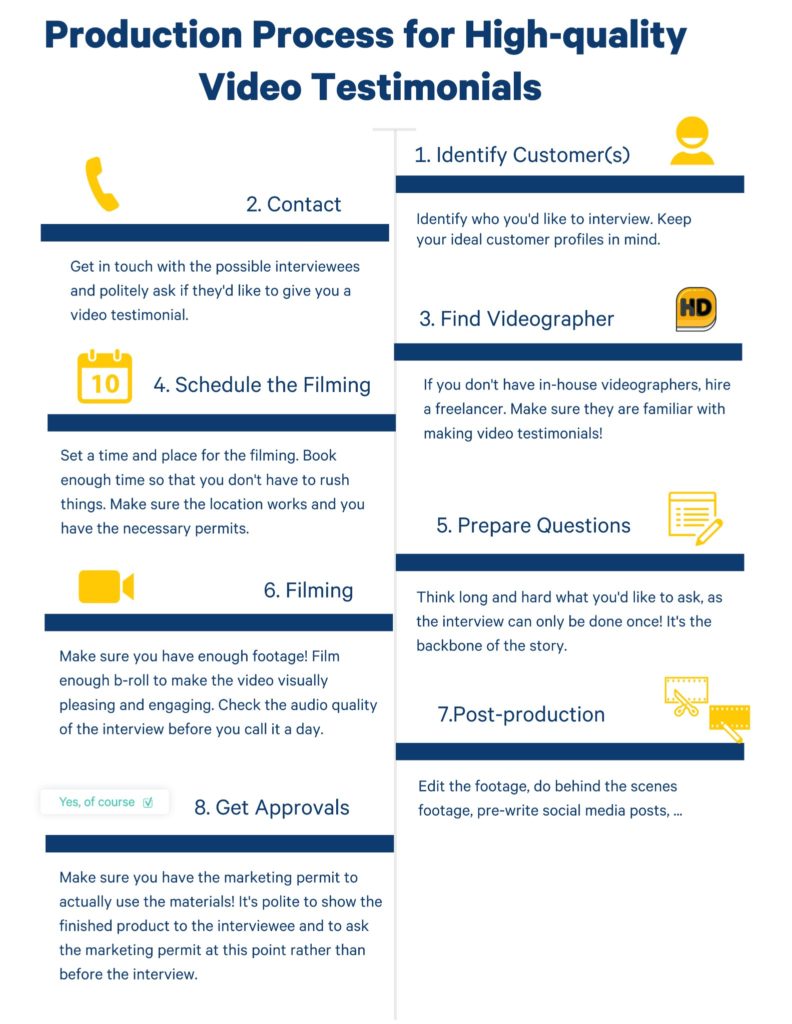
- Identify the customer you’d like to interview
- Contact them to ask if they’d like to participate
- Find a videographer
- Schedule the filming
- Prepare questions to ask (Think about those tangible results!)
- Post-production (editing video, pre-writing of posts,...)
- Get approvals
Take a look at this testimonial produced by us.
It’s like we’re in the movies.
Whether this is what you're looking for depends on your target viewer. For ordinary people looking for peer reviews, an overly polished video may come across as inauthentic. On high-value projects, it may be exactly what is needed.
Nevertheless, hiring a pro is expensive.
How Much Can a Single Video Testimonial Cost?
From a few thousands up to tens of thousands. Consulting, filming, editing, gear, travel to location — it all adds up.
It also takes time as the editing may take days if not weeks in huge productions. Creative process is something you can’t really hurry.
Furthermore, you need to design the script and the interview questions yourself if you are not partnering specifically with a testimonial video agency. Additionally, what sort of visual interest can you add to the video to really complement the story.
Consider your resources and your target viewers. A professional video producer may be essential to your marketing campaign's success, or it may be an enormous waste of money.
Option #3: Do It Yourself
Of course, you can also do it all yourself (probably the most expensive and high risk that you won't get it done in the end).
Creating a video testimonial entirely in-house offers flexibility, creative freedom and avoiding external costs — in theory. This requires that your creative process works. In practice, it can be a costly headache. If you opt for doing it all on your own, have a quick look at our best practices first.
If you're looking for simple, phone-filmed customer stories, you may have all the gear and talent needed for the project. You still need to get the customers to appear on camera. This may involve travel to location or paying them to get to you.
And if you want professional quality, you need to get expensive gear and learn videography and editing software. This translates to spending plenty of time and money.
In a nutshell, producing a single testimonial in-house requires solving plenty of pain points. In general, it’s not recommended. Furthermore, your customers are more relaxed if you’re not present at the filming.
However, if you have a specific kind of testimonial in your mind that you think you can best create on your own, then in-house production may be the way to go. Just be aware of the almost inevitable hassles and expenses that will incur.
In our recent blog post, How to Make a Testimonial Video, we go over the typical pain points in making customer testimonial videos. In addition, it explains in detail how to make a testimonial video.
How to Ask Customers for Video Testimonials?
This is the scary part. Asking for a favor from a stranger — not fun, right? Especially if you're operating in the B2B field, you might feel a little hesitant about asking for a video testimonial.
But your customers are not strangers. And more importantly, your happy customers are not strangers — they know and LOVE your product. They are like your friends!
Doesn’t seem so hard anymore, does it?
Now, I want you to take a look at a typical testimonial request to see how it happens in practice.
But first, imagine that you’ve already bought something from the company — say, an ergonomic office chair — and you LOVE it. You’ve already been thinking in your head:
“This company saved my life, they provided exactly what I’ve been looking for. They rock!”
And now, you’re greeted with this in your inbox:
How do you feel?
It’s not so difficult. A satisfied customer only needs a little bit of encouragement and good vibes to agree to film a testimonial — and as long as the process is easy, they do it right away. One click to record, one click to send. Voilà!
With the right tool, you can even first ask for a regular text review, and once the customer has done the thinking, you can request a video review with the same form. Perhaps using this tactic can lower the threshold of leaving a video testimonial.
Read further video testimonial tips with an emphasis on B2B video testimonials.
Interview Questions to Ask (Tested on +5,000 people!)
Now that you’ve identified who you want to approach and how to reach out to them, it’s time to figure out what to say to them — or more specifically, what video testimonial questions to ask to help them talk about relevant things.
To make the process smooth and get the best possible result from a marketing perspective, you need to consider two things:
- how to make it effortless for the interviewee
- how to make it relevant and relatable to the viewers
Themes to Cover During Testimonial Video Interview
- Introduction of the interviewee (name, title, company, location)
- Where are we now? (For context. “We’re now at our HQ in Texas.”)
- How did you find out about us?
- What were the pain points that made you look for a solution?
- What kind of tangible results have we been able to produce?
- Could you provide us with a great example of how we’ve helped you?
- Quality of our service?
- What could we do even better?
- Would you recommend us to someone else? Why or why not?
Asking these nine questions will guarantee that this single customer case study will be a coherent story and be relatable.
Build Trust in Viewers
The person who is watching the testimonial is watching it for a reason. They already have some degree of interest in the subject, but they’re not yet sure if you can be trusted. A customer testimonial video is great in building that needed brand awareness.
Highlighting the benefits of your cooperation or service won’t be enough. To get more sales, one thing you need to keep in mind is your target audience while editing the final result.
Emphasize the overall positive impact you’ve had on this particular customer’s life. Make them the hero of the story. Highlight the benefits they’ve experienced and let them tell all that in their own words.
Remember that not everything has to be said out loud. People considering buying your services are looking for a great deal and can also read between the lines. Create a story that has that welcoming feeling.
Don't forget to consider the business you're in! For example, patient video testimonials and fitness testimonials have a different feel to them than B2B stories.
Now that you know how to make video testimonials, we can already move on to how to use them.
How to Use Video Testimonials
In order to be able to achieve exactly what you want whether it be increased brand awareness, emotional connection with potential customers or telling the success stories of your existing customers, you need to be aware of the common channels.
The next section focuses on going over those.
How to Use Customer Testimonial Videos in Marketing
Using video testimonials in marketing helps you to increase the trust between you and the customer. This comes in handy both in marketing and sales. Indeed, video testimonials are used by companies to create awareness and interest as well as increase conversions.
Social media
On social media, a customer testimonial video can be embedded in short posts promoting the product or service in a way that fits right into the social media canvas: short, casual, relatable.
On Website
Not everybody visiting your website is ready to convert right away. They may still be in the early stages of consideration. To convince them that you’re worthy of their money, you may display testimonials in various parts of the website.
Here are some ideas for the placement of testimonials on your website:
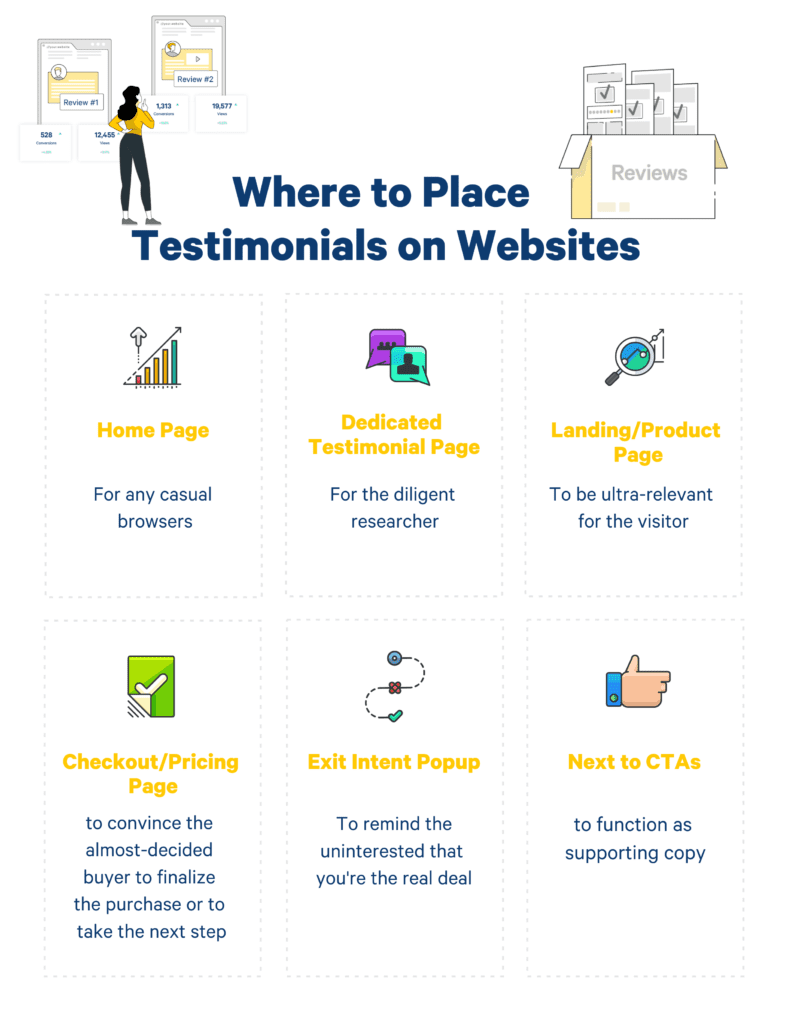
- home page for any casual browser
- a dedicated testimonials page for the diligent researcher
- landing page or product page to be ultra-relevant to the visitor (when they see the same problem they have being resolved, it's a real game-changer!)
- checkout page to convince the almost-decided buyer to finalize the purchase
- exit intent popup to remind the uninterested that you're the real deal
You can also utilize your website's analytics to see where people spend time and consider adding a testimonial there.
Advertisements
Testimonials are not your traditional advertisements, as they’re unscripted and just real customers talking on their own.
But they can nevertheless be USED as advertisements — often far more powerful than the traditional scripted types.
You’ve probably already seen customer testimonials on YouTube ads. Yours could be there as well — or even on television. Why not?
In some cases, you could even adapt your testimonials into audio testimonials and use them on radio and audio streaming services. Podcasts are very in right now, so why not leverage this marketing channel as well?
How Customer Testimonial Video Can Boost Your Sales
Your prospect has reached the decision stage. And here, social proof matters just as much as in the previous stages, if not more.
In one case study, simply adding a testimonial increased the conversion rate by 32%.
Let's break it all down.
Website
The use of testimonial videos on your website for sales purposes is largely similar to the marketing uses as described in the previous chapter.
That’s good news for you, as the testimonials will work both for the prospects just getting to know your brand as well as the ones at the verge of clicking buy.
To close the sale, placing testimonials as close as possible to the moment of buying is good practice. Consider for example:
- exit intent popups to assuage the doubts of a visitor exiting a product page
- checkout page to convince the buyer almost ready to click buy
- a product page to be ultra-relevant to the prospect
Abandoned Cart Email
Another good place for a customer testimonial video is the abandoned cart email.
Abandoned cart emails are tough — every wording seems somehow inadequate. However, you should let your existing customer speak for you. Let the video testimonials do the talking.
Presentation
You know the usual sales deck: one page after another with text, and graphs that try to convince the prospect.
It’s a tried-and-tested approach and works just fine. However, adding a customer testimonial video can add power to the punch.
You can utilize video in your pitches and presentations in many ways:
- Incorporate a video testimonial into your sales deck (embedded directly into the slideshow)
- Show a video at any part of your in-person sales presentation
- Use a video testimonial alone in the place of a sales deck
If you decide to incorporate a video into your sales deck, you should embed it directly to the slideshow to avoid any friction. The major slideshow tools like PowerPoint and Google Slides allow you to embed a video into a slide presentation easily and seamlessly.
It's important for the video to be embedded seamlessly without having to click on links or opening media players. Those ruin the flow.
If you're giving a presentation in-person, showing various documents, graphs and videos to one or more prospects, it's easy to interject "by the way, I thought you might be interested in what our customer Jane says about our service" and click play. Smooth and efficient.
And finally, you might consider using a testimonial video alone in place of a sales deck. It may seem a bit risky to completely do away with the sales deck, but think about it: if the customer appearing on the video goes through all the relevant issues in the testimonial, wouldn't this be the most concise way to get through to the prospect?
This may work well if you're cold emailing a prospect. Trying to get a stranger to go through your sales deck may be quite difficult: get them watch a testimonial video — perhaps a tad easier.
Sales Offer
Everybody gets sales offers and for some projects they receive many. How can you stand out and make them choose you over others?
Adding a customer testimonial video to your offer is a great way to catch the prospect's attention. Written testimonials are commonly used in offers anyway, so video just supercharges the already tried-and-tested format.
If you think of the problems with offers, they are:
- the prospects are busy and hastily skim through them
- Every company's offer looks the same (text, graphics, same old formats and wordings)
Adding a video testimonial to your offer can help to:
- Catch the prospect's attention and increase trust in your business
- Help a busy prospect quickly grasp the essence of what they should do similar projects with you
- Make it memorable and stand out from the others
Start Using Customer Testimonial Videos
Now you know what makes a customer testimonial video great and what are the different ways to start using them.
A quick recap of the main lessons:
- Video testimonials are an increasingly effective format in all social channels
- Testimonial video makes your brand more credible
- Video testimonials can be used in all stages of the sales funnel
- Creating video testimonials is easy and affordable with dedicated software
Further Reading
If you need more articles, take a look at these:
Satokausikalenteri: Video reviews to aid customer’s purchase decision
Case example: 32% increase in sales by using video testimonial on check-out page
7+ Tips for Using Customer Testimonial Videos in Marketing
5 Best Practices for Video Testimonials
FAQ on Video Testimonials
How much does creating a video testimonial cost?
From a few cents to tens of thousands of dollars. It depends whether you’re using a testimonial software or creating them one by one by professionals.
What kind of testimonials work best?
Authentic video testimonials are your best bet of increasing conversions across your whole sales funnel.
How do you ask for a customer testimonial video from your customers?
Politely and directly. Ask them “for a small favor” to increase your chances of getting one. No matter if you want video testimonials from B2B or B2C customers, the same principle applies.
What proportion of my happy customers accept to be featured on a testimonial video?
According to our experience, all genuinely happy customers will agree to take part if:
- It’s made easy for them
- They get to see and approve the materials before they’re published
- You’ve done a great job with creating a relationship with their business
